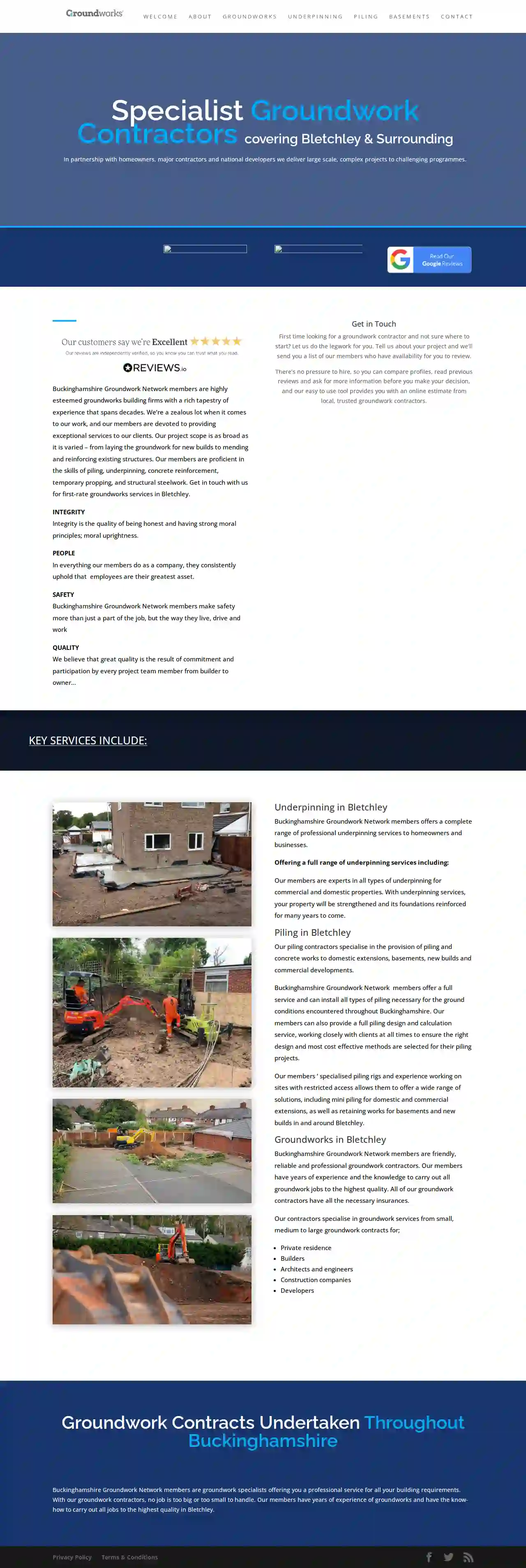Excavation Contractors Olney
Top 10 Excavation Services in Olney
Get up to 3 Excavating Contractors quotes for your project today! Compare profiles, reviews, accreditations, portfolio, etc... and choose the best offer.

Elmtree Enterprises Ltd
4.737 reviewsBletchley, GBA warm welcome With over 21 years of experience, our family-run business takes pride in adopting a personalized approach to every project we undertake. We specialize in creating exceptional opportunities in rural locations, ensuring that each endeavour is unique and tailored to our clients' needs. Our construction services extend to a 2.5-hour radius, covering areas such as London, Oxford, Luton, Cambridge, Northampton, Coventry, Birmingham, Leicester, Derby, Nottingham, Warwickshire, Essex, Hertfordshire, Worcestershire, and Peterborough. At Elmtree Construction, we prioritize the implementation of renewable energy solutions across all our construction and equestrian projects. Sustainability and environmental consciousness are fundamental aspects of our work.
- Services
- Why Us?
- Gallery
Get Quote
Charles Bracken Ground Works Ltd
31 reviewsBletchley, GBSpecialist Groundwork Contractors covering Bletchley & Surrounding In partnership with homeowners, major contractors and national developers we deliver large scale, complex projects to challenging programmes. Buckinghamshire Groundwork Network members are highly esteemed groundworks building firms with a rich tapestry of experience that spans decades. We’re a zealous lot when it comes to our work, and our members are devoted to providing exceptional services to our clients. Our project scope is as broad as it is varied – from laying the groundwork for new builds to mending and reinforcing existing structures. Our members are proficient in the skills of piling, underpinning, concrete reinforcement, temporary propping, and structural steelwork. Get in touch with us for first-rate groundworks services in Bletchley. Our Values INTEGRITY Integrity is the quality of being honest and having strong moral principles; moral uprightness. PEOPLE In everything our members do as a company, they consistently uphold that employees are their greatest asset. SAFETY Buckinghamshire Groundwork Network members make safety more than just a part of the job, but the way they live, drive and work QUALITY We believe that great quality is the result of commitment and participation by every project team member from builder to owner… Get in Touch First time looking for a groundwork contractor and not sure where to start? Let us do the legwork for you. Tell us about your project and we’ll send you a list of our members who have availability for you to review. There’s no pressure to hire, so you can compare profiles, read previous reviews and ask for more information before you make your decision, and our easy to use tool provides you with an online estimate from local, trusted groundwork contractors.
- Services
- Why Us?
- Gallery
Get Quote- CE
CEMEX Bletchley Asphalt Plant
436 reviewsBletchley, GB- Services
- Why Us?
Get Quote - Co
Complex Builders
36 reviewsBletchley, GB- Services
- Why Us?
Get Quote - Eu
Eugen Phoenix Solution Ltd
52 reviewsBletchley, GB- Services
- Why Us?
Get Quote - TR
TREX SAFE
Bletchley, GB- Services
- Why Us?
Get Quote - Ba
Baxley Construction and Landscaping
Bletchley, GB- Services
- Why Us?
Get Quote
Over 13,059+ Excavation Businesses on our platform
Our excavation contractors operate in Olney and surroundings!
ExcavationHQ has curated and vetted the Best Excavation Pros in and around Olney. Find a reliable pro today.
Frequently Asked Questions About Excavation Contractors
- Planning and Surveying: Defining the excavation area, marking utility lines, and determining the required depth and grade.
- Site Preparation: Clearing vegetation, removing obstacles, and ensuring site accessibility.
- Excavation: Using appropriate equipment (excavators, backhoes, etc.) to remove earth and create the desired excavation.
- Hauling and Disposal: Transporting excavated material to designated disposal sites, complying with environmental regulations.
- Backfilling and Compaction: Refilling the excavation with suitable material and compacting it to achieve the required density and stability.
- Grading and Finishing: Leveling and shaping the surface to the final grade for landscaping or construction.
- Utility Locates: Contact your utility companies to mark the locations of underground lines before excavation begins. This is usually a free service.
- Hand Digging: Excavate carefully by hand near marked utility lines to avoid damage.
- Potholing: Digging small test holes to expose and verify utility depths and locations.
- Safe Distances: Maintaining a safe distance between excavation equipment and marked utility lines.
- Vacuum Excavation: Using vacuum excavation techniques to expose utilities without digging, reducing the risk of damage.
- Clear the Area: Remove any obstacles, including vehicles, outdoor furniture, landscaping features, or structures, from the excavation zone and surrounding area.
- Mark Existing Features: Identify and mark underground utilities, septic tanks, sprinkler systems, or other buried elements you want to protect.
- Protect Landscaping: Use tarps or fencing to shield trees, shrubs, gardens, or other landscaping elements from damage.
- Provide Access: Ensure the excavation contractor has clear access to the work area, including gates wide enough for equipment.
- Discuss Logistics: Coordinate with the contractor regarding parking arrangements, material delivery, and any special instructions or concerns you might have.
- Spring and Fall: Often considered favorable due to moderate temperatures and drier soil conditions.
- Summer: Can be suitable, but hot weather can make working conditions challenging and might require additional measures (shade, hydration) for workers.
- Winter: Excavation in winter can be more difficult due to frozen ground, snow, and potential delays caused by inclement weather. It might also require specialized equipment or techniques.
What is the excavation process?
How do you protect utilities during excavation?
How do I prepare my property for excavation?
What is the best time of year for excavation?
What is the excavation process?
- Planning and Surveying: Defining the excavation area, marking utility lines, and determining the required depth and grade.
- Site Preparation: Clearing vegetation, removing obstacles, and ensuring site accessibility.
- Excavation: Using appropriate equipment (excavators, backhoes, etc.) to remove earth and create the desired excavation.
- Hauling and Disposal: Transporting excavated material to designated disposal sites, complying with environmental regulations.
- Backfilling and Compaction: Refilling the excavation with suitable material and compacting it to achieve the required density and stability.
- Grading and Finishing: Leveling and shaping the surface to the final grade for landscaping or construction.
How do you protect utilities during excavation?
- Utility Locates: Contact your utility companies to mark the locations of underground lines before excavation begins. This is usually a free service.
- Hand Digging: Excavate carefully by hand near marked utility lines to avoid damage.
- Potholing: Digging small test holes to expose and verify utility depths and locations.
- Safe Distances: Maintaining a safe distance between excavation equipment and marked utility lines.
- Vacuum Excavation: Using vacuum excavation techniques to expose utilities without digging, reducing the risk of damage.
How do I prepare my property for excavation?
- Clear the Area: Remove any obstacles, including vehicles, outdoor furniture, landscaping features, or structures, from the excavation zone and surrounding area.
- Mark Existing Features: Identify and mark underground utilities, septic tanks, sprinkler systems, or other buried elements you want to protect.
- Protect Landscaping: Use tarps or fencing to shield trees, shrubs, gardens, or other landscaping elements from damage.
- Provide Access: Ensure the excavation contractor has clear access to the work area, including gates wide enough for equipment.
- Discuss Logistics: Coordinate with the contractor regarding parking arrangements, material delivery, and any special instructions or concerns you might have.
What is the best time of year for excavation?
- Spring and Fall: Often considered favorable due to moderate temperatures and drier soil conditions.
- Summer: Can be suitable, but hot weather can make working conditions challenging and might require additional measures (shade, hydration) for workers.
- Winter: Excavation in winter can be more difficult due to frozen ground, snow, and potential delays caused by inclement weather. It might also require specialized equipment or techniques.